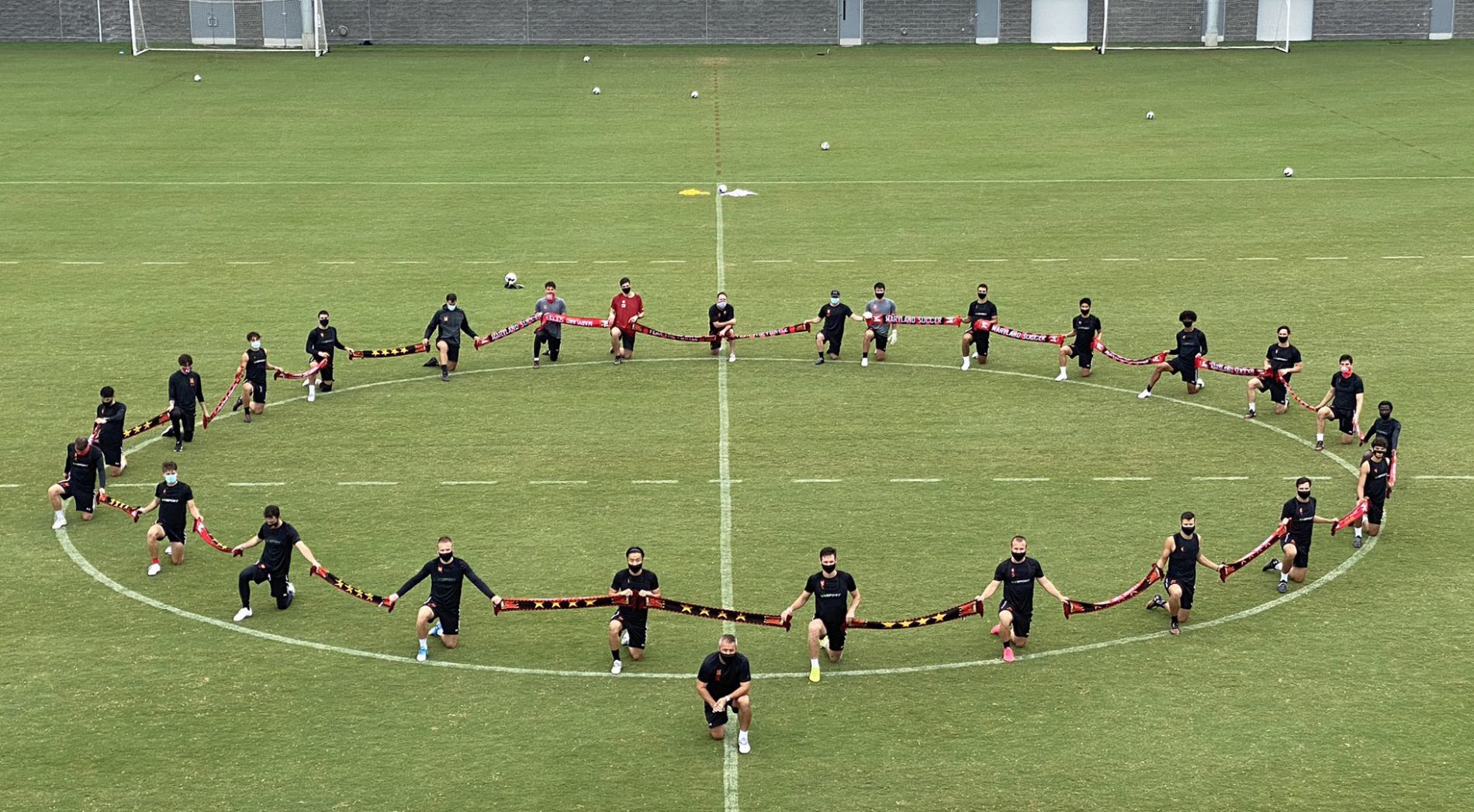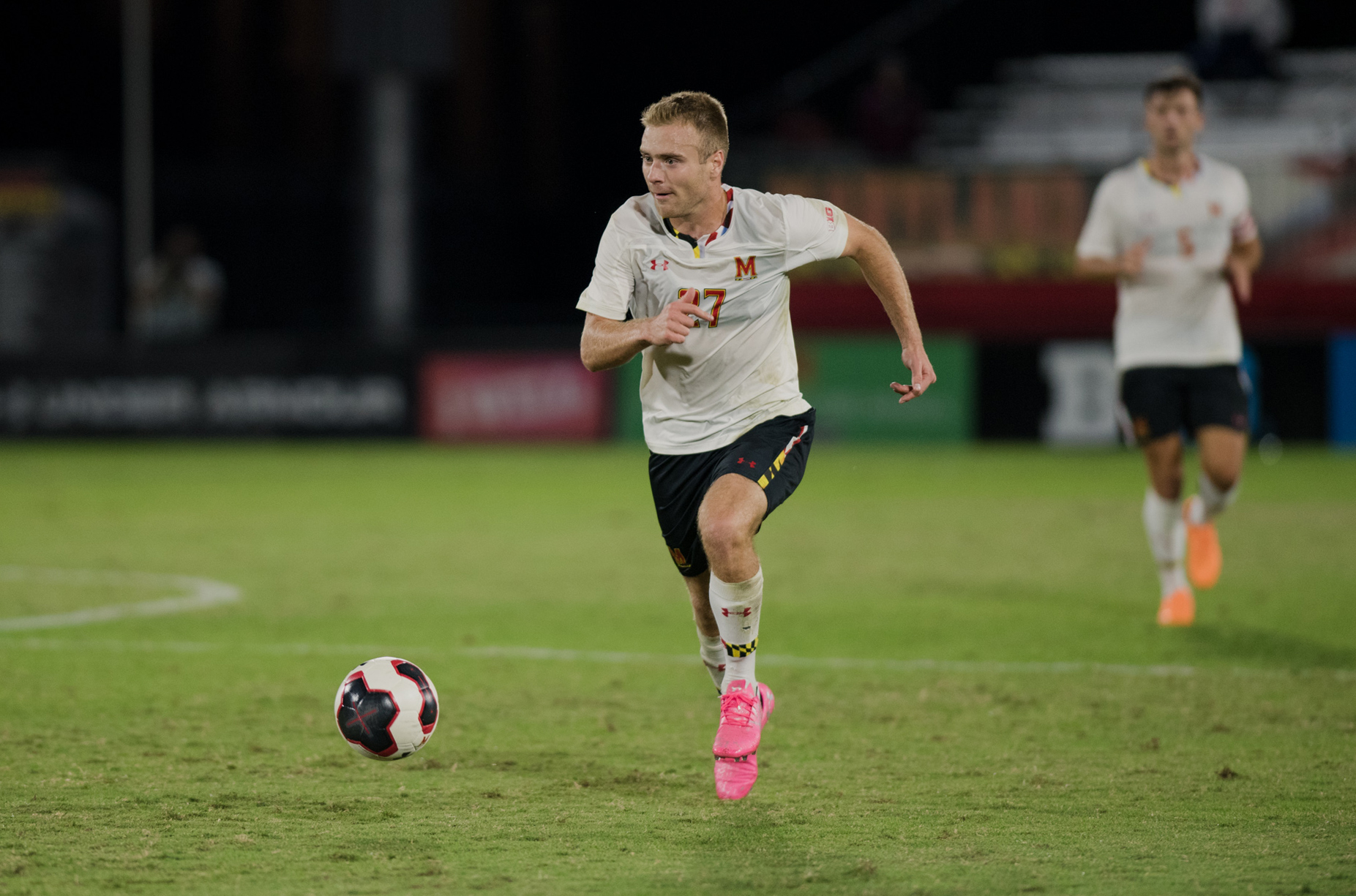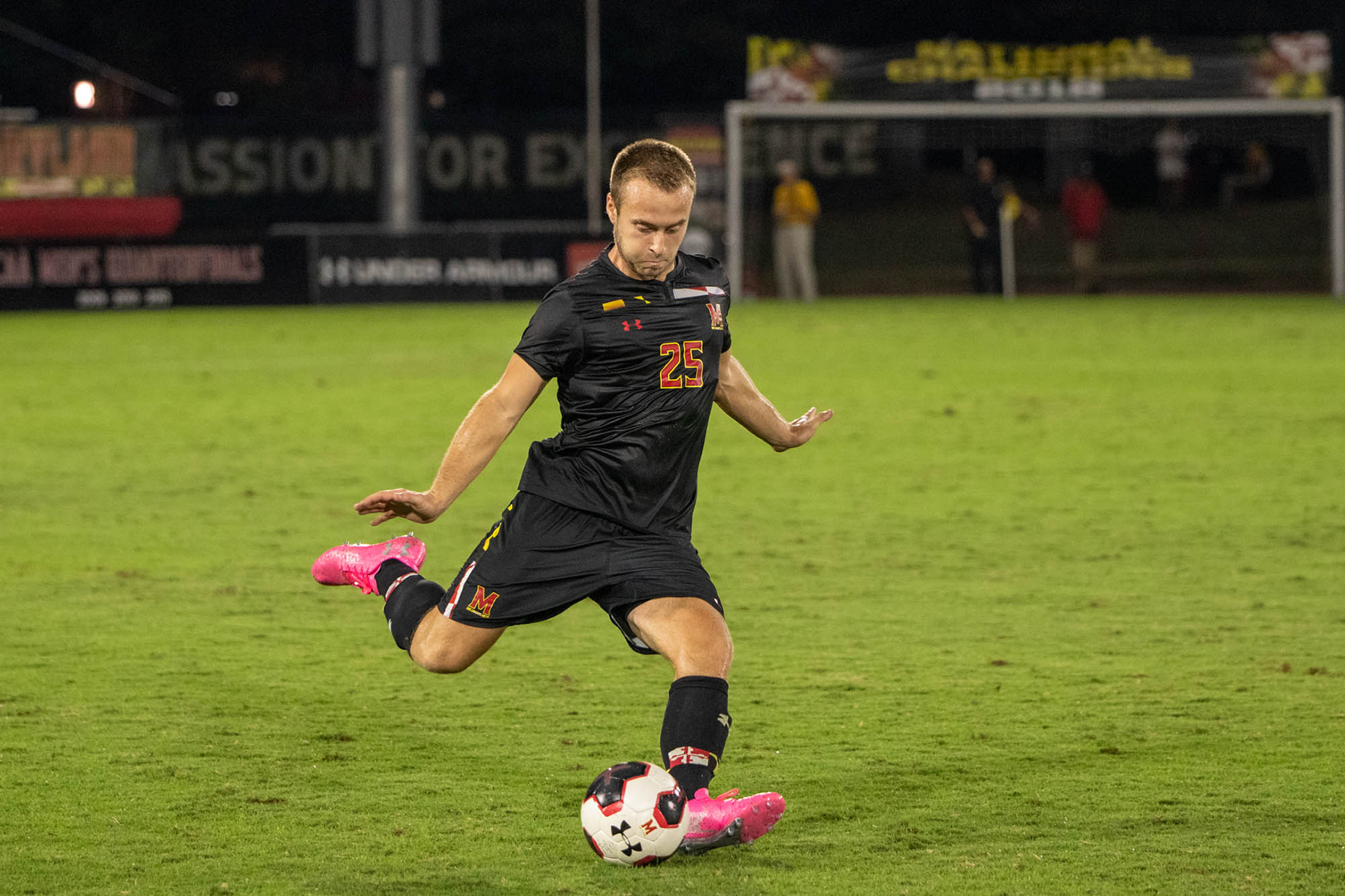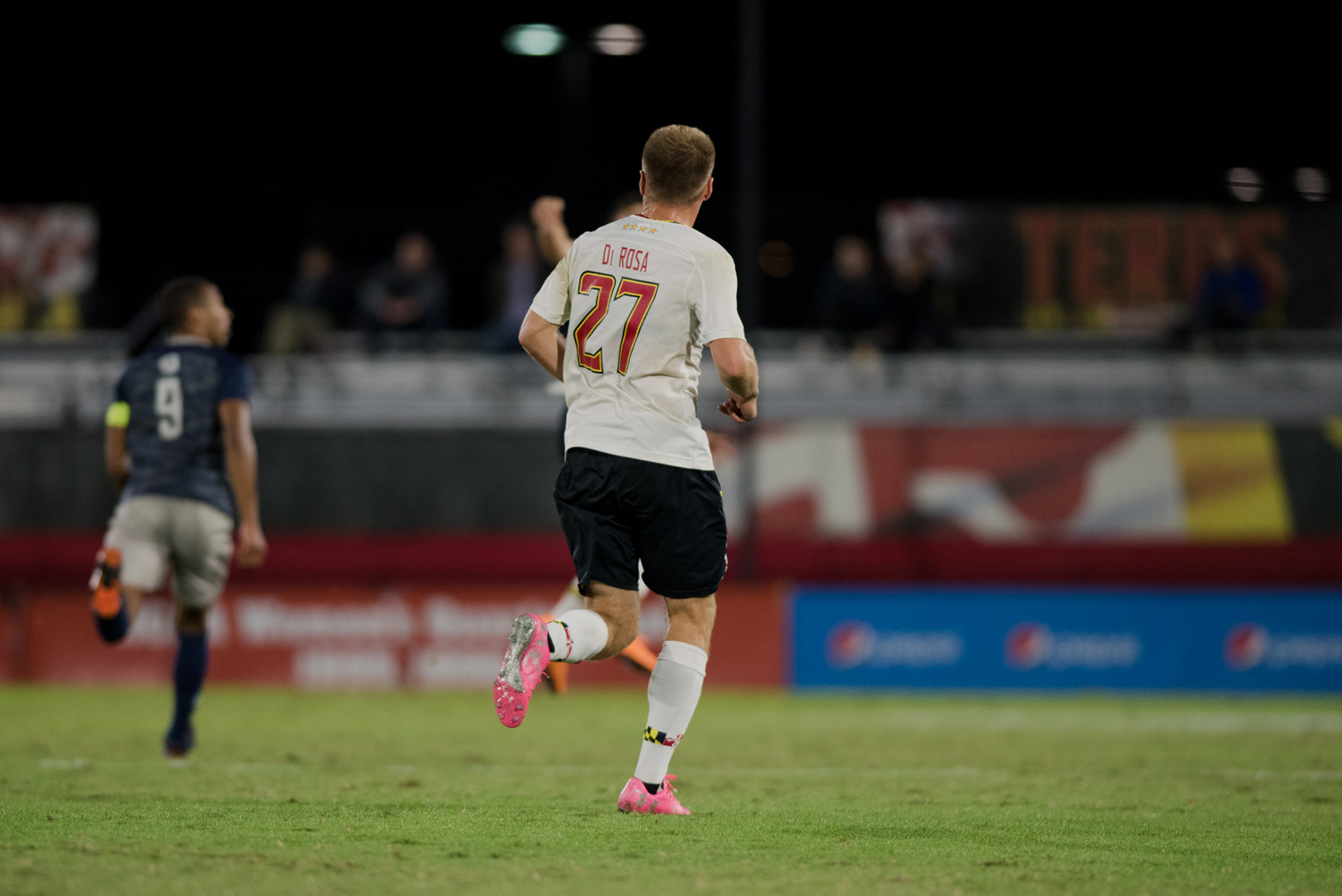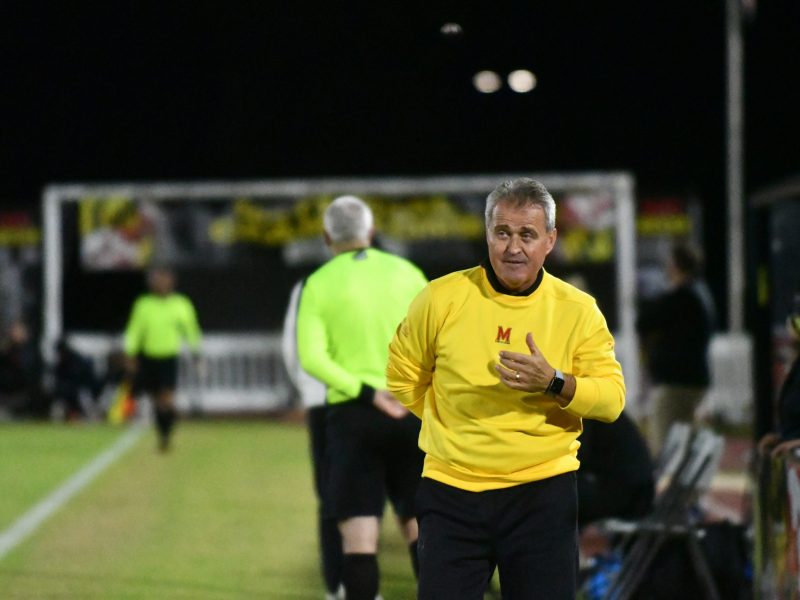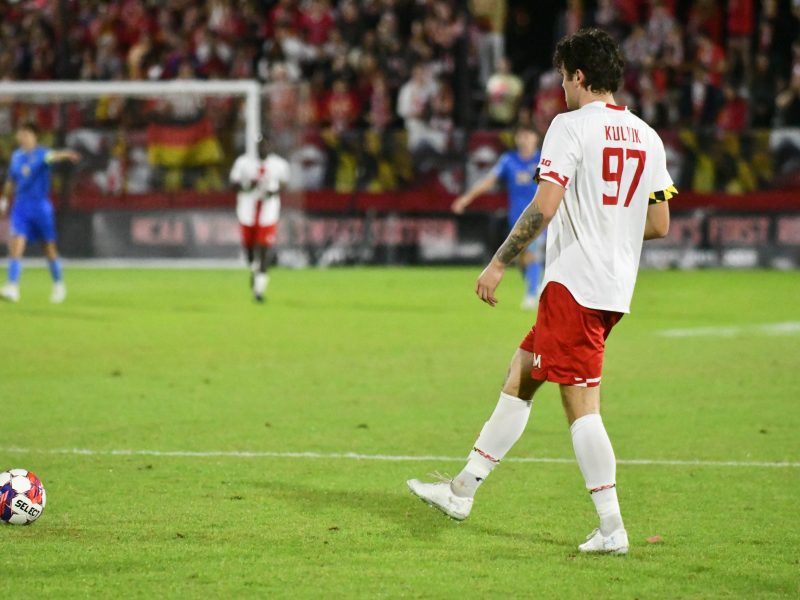Two weeks ago, Maryland men’s soccer winger Paul Bin texted his teammates.
He told them he wanted to kneel in solidarity against racism and police brutality. He said he wanted to capture a photo of the team kneeling to circulate on social media.
And the rest of the squad said they’d be right there with him.
“The immediate reaction was super supportive,” right back Ben Di Rosa said. “Everyone was eager.”
While many other teams at this university — and across America — stayed quiet, Maryland soccer took action. On Monday, the Terps captured a photo of the whole squad kneeling in a circle, holding Maryland scarves in a symbol of solidarity and unity.
And it’s not the first time one of coach Sasho Cirovski’s teams has acted on a political issue. The Terps have regularly stood in solidarity with those protesting injustices, drawing from a culture that champions diversity, inclusion and the prerogative to speak out.
“[Through generations], I think Maryland men’s soccer has always accepted and loved diversity within the team,” Bin said.
Full backs Ben and Matt Di Rosa wore pink cleats in October 2019 in support of Breast Cancer Awareness Month. In 2016, Cirovski pushed for the nation’s first college soccer pride night. And under safer conditions, the Terps have encouraged their athletes to attend protests.
Last week’s gesture was the most recent in a string of events in which the team has stood up for a cause. But unlike movements past, this particular gesture was a long time coming.
After the killings of Breonna Taylor and George Floyd thrust the Black Lives Matter movement back into the national spotlight, conversations about race and social injustice became a regular fixture of the Terps’ Zoom meetings. That often meant uncomfortable discussions — but ones the team had regardless.
“We vowed to continue that conversation,” Cirovski said.
[“A beautiful game”: Soccer has provided reflection and comfort for Isaac Ngobu]
Though those conversations continued throughout the summer, the Terps found that social distancing and the absence of group training made a unified act difficult.
But when Jacob Blake was shot seven times in the back by police officers, the tone changed. The team felt a sense of urgency, and, spearheaded by Bin’s text, they quickly formed a plan.
“They came to us and didn’t want to wait. They wanted to get something done right away,” Cirovski said.
Still, Cirovski didn’t want to act too hastily. Well aware of the impact of any potential gesture, the Terps wanted to make sure they talked about the issue first.
“We had to make sure we used this opportunity to talk about things first, again,” Cirovski said. “It jump-started the conversation.”
And after the Terps convened, the specifics came. Evoking a pose from numerous professional teams on social media, the Terps kneeled, tracing the lines of the center circle.
One element was missing, though: a symbol of unity. Maryland had to follow social distancing regulations, making physical contact impossible. Cirovski suggested the team hold up Maryland soccer scarves, reaching end to end.
“The scarf is an important soccer tradition, it’s also an important Maryland soccer tradition,” Cirovski said. “We thought it would be a good way … to be connected.”
It was an image that the team hoped would have a profound impact.
“Personally I have to love every second of that picture. Especially with us being a college team a lot of younger kids look up to us, and follow our lead,” full back Isaac Ngobu wrote in a message.
[“Can’t be ignored”: Buoyed by NBA, UMD’s Black athletes speak out against systemic racism]
Maryland is a program well aware of its traditions. In 2016, it established a new one. Former full back Robbie Rogers, who attended Maryland for one season in 2005, made a profound impact on the pitch. His seven goals and five assists in 22 appearances earned him an ACC All-Conference Freshman Team berth — and helped lead Maryland to a national championship.
In 2013, Rogers became the first openly gay athlete in America’s five major professional sports leagues. And, three years later, with Rogers’ help, Maryland hosted its first pride night.
“I am incredibly proud of Robbie,” Cirovski said at the time. “He is a special human being. The outpouring of love that he has received is a clear indication of the unconditional support he has from everyone. I love Robbie for Robbie.”
Then, on July 28, 2017, Lizandro Claros Saravia was detained by ICE agents in Baltimore and was ordered to be deported. Saravia had just had a normal check-in; in fact, he was telling immigration officials that he was due to attend Louisburg College on a soccer scholarship.
He and his brother had entered the United States illegally in 2009 but were protected by the Deferred Action for Childhood Arrivals program. Under the Trump presidency, though, those initiatives crumbled. Saravia and his brother, Diego — alongside many others protected by the DACA policies — suddenly became a priority to be removed from the country.
Ben and Matt Di Rosa played club soccer with Saravia and were devastated by the news. The two brothers were yet to start preseason in their freshman year in College Park, but the support from their soon-to-be teammates was overwhelming.
“I couldn’t have been happier with how the locker room responded to that. They were really apologetic to me even though it really deserved to be [to] Lizandro,” Ben Di Rosa said.
The team supported the new recruits through a painful process, including a quickly organized protest in front of the ICE headquarters.
And although Saravia and his brother were sent back to their native El Salvador, they still keep regular contact with their old teammates.
“He’s actually having a really successful soccer career in El Salvador, which I’m really happy about,” Ben Di Rosa said.
The Terps have supported the Di Rosa brothers’ decision to use their platform before. Last October, Ben and Matt Di Rosa honored their mother and aunt, two breast cancer survivors, by donning bright pink cleats featuring their initials.
With such an emphasis on flashy footwear on the field, their bright shoes were an easy way to draw attention to Breast Cancer Awareness Month. Simple as it may have been, the boots stood out from the usual black, white or red that the rest of the squad wore on a nightly basis.
All of these gestures are a product of Maryland’s culture — one that values every opinion and listens to every voice. It’s been a major factor on the pitch, Bin said.
However, there is a sense among the club that gestures alone won’t bring about major change. Cleats, pictures, events and supportive words all help, but they need to be sustained.
“I’d like this to continue. We often get carried away in the moment. We’re like, ‘Oh my God, this is what’s happening right now, we need to do this right now,’” Bin said. “But I would like to see a little more consistency. Because I think consistency is the foundation of trying to change something.”
So, Maryland is determined to keep the conversation going, and plans to do more once regulations have been lifted. For now, the Terps will continue to use their platform, because they believe support and solidarity is a necessity.
“For me it’s the right thing to do. There’s no choice,” Bin said.
CORRECTION: Due to a reporting error, a previous version of this article and its caption stated that Maryland soccer kneeled in solidarity with the Black Lives Matter Movement. They kneeled in solidarity against police brutality and racism. This article has been updated.
